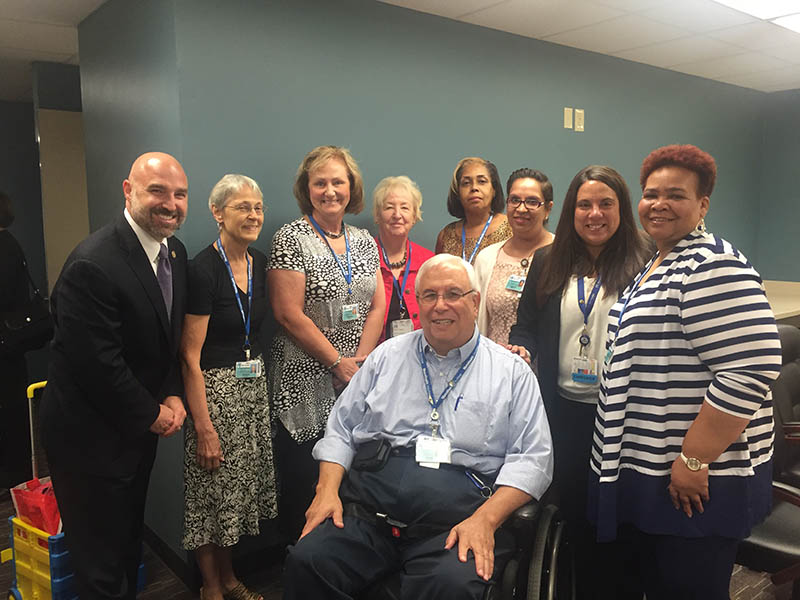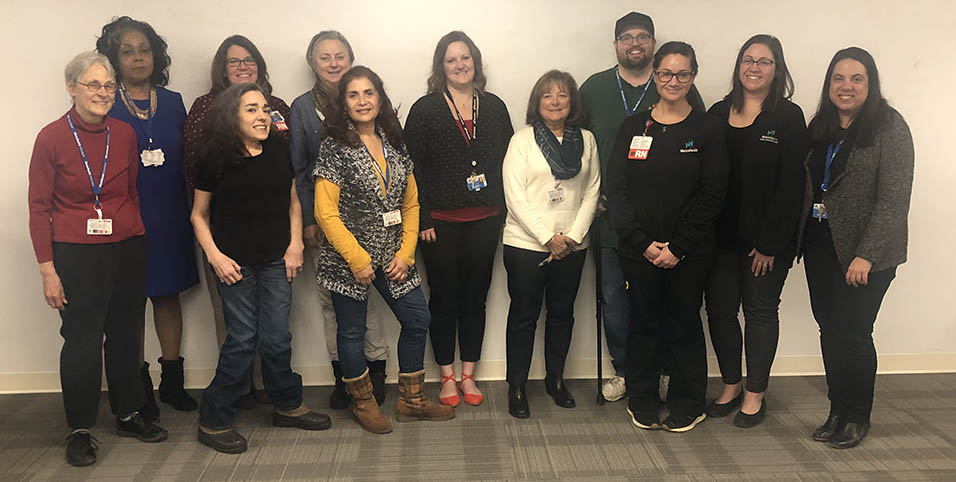
The MetroHealth System, Cuyahoga County, Ohio’s public health system, provides care at four hospitals, four emergency departments, more than 20 health centers, and 40 additional sites. In 2018, its staff of 7,500 served 300,000 patients at more than 1.4 million visits; 75 percent of those patients were uninsured or covered by Medicare or Medicaid.
The health system is home to Cuyahoga County’s most experienced Level I Adult Trauma Center, verified since 1992, and one of two adult and pediatric burn centers in the state of Ohio. As an academic medical center, MetroHealth is committed to teaching and research. Each active staff physician holds a faculty appointment at Case Western Reserve University School of Medicine.
MetroHealth is breaking ground on a new hospital in April 2019, honoring a commitment to create a healthier community by building a new hospital on its main campus in Cleveland. The building and the 25 acres of green space around it are catalyzing the revitalization of MetroHealth’s West Side neighborhood. For more information, visit metrohealth.org.
Patient and Family Advisor Program
MetroHealth’s commitment to patient- and family-centered care was formalized in 2013 with the establishment of the Office of Patient Experience. The following year, the Patient and Family Advisory (PFA) task force was created to bring the voice of patients and families into system operations. The task force included two patient and family volunteer advisors, and health care providers from multiple disciplines. Subsequently, Jennifer Lastic was recruited as the Program Coordinator for a new Patient and Family Advisor Program and worked with the task force to develop the program.
In the fall of 2014, MetroHealth held multiple information sessions to recruit potential advisors. Lastic also embarked on an educational and recruitment campaign within the system, taking the message about the PFA Program to meetings of the Executive Committee, managers, and departments. Attendees learned about the program and were encouraged to provide referrals for potential PFAs.
Shortly after, MetroHealth began to integrate Patient and Family Advisors on various committees and projects. Before placing a PFA on a committee, Lastic attended committee meetings to educate staff about partnering with PFAs and she accompanied PFAs to their first meetings.
Currently, MetroHealth has 50 Patient and Family Advisors. Their on-boarding process is through the Volunteer Department, which is within the Office of Patient Experience. New PFAs attend the general volunteer orientation as well as a PFA-specific orientation with the Program Coordinator.
PFAs now participate on a variety of committees, including:
- Patient and Family Advisory Council (PFAC)
- Leader’s Boards – Patient Experience, Quality, Inclusion and Diversity, Federally Qualified Health Centers
- Inpatient Patient Experience Task Force Teams
- Language Access Committee
- TeamSTEPPS Action Councils
- Arts in Medicine Advisory Council
- Ethics Committee
PFAs in Ambulatory Care
With more than 500 providers, MetroHealth’s Internal Medicine Department and Family Medicine Department deliver primary care in more than 20 ambulatory health centers. Several MetroHealth primary care practices have been recognized by NCQA as Level 3 PCMHs. Patient and family advisors are also integrated in the ambulatory health care setting through a variety of projects and committees.
PFAs and Campus Transformation
PFAs also partner with staff on a variety of projects, including those related to campus transformation. During the development of the Critical Care Pavilion, starting in 2014, PFAs were recruited to provide their feedback on the proposed design of patient rooms and other spaces.
Campus transformation now includes development of the new hospital, scheduled for completion in 2022. During the experiential planning phase in 2015, the Campus Transformation Advisory Committee, composed of 14 PFAs with various experiences at MetroHealth, was created. Walter Jones, Senior Vice President, Campus Transformation, and the Executive Architect from HKS Architects met to give an overview of the campus transformation and the role of PFAs in experiential planning. The committee meets periodically with HKS for brainstorming workshops, which include visionary exercises, as well as process flow planning.
Patient and Family Advisory Council
MetroHealth's PFA task force transitioned into the Patient Experience Steering Committee; its role is to oversee and sustain the Patient and Family Advisor Program and to ensure the viability, sustainability, and effectiveness of the Patient and Family Advisory Council (PFAC).
Created in January 2015, the role of the PFAC is to advise MetroHealth on programs and policies to meet the needs of patients and family members. The PFAC is committed to ensuring the provision of safe, high quality, patient- and family-centered care at MetroHealth. Two co-chairs, one clinician and one PFA, lead the PFAC. The Council meets monthly.
Initially, Lastic recruited and screened PFAs from MetroHealth's existing cadre of PFAs and recruited some new PFAs. Fifteen PFAs now serve on the PFAC. In February 2015, openings for employee PFAC members were posted on MetroHealth’s internal website. Almost 100 employees expressed interest and six, representing multiple disciplines, were selected.
The PFAC has worked on many projects, including:
- Walk-throughs of the campus and buildings and development of campus maps
- Staff orientations and in-service training
- Development of patient materials and brochures, including the Patient Guide, Admission Guides, family transfer forms
- Story sharing in a variety of settings, e.g., panels, nursing forums, Patient Experience Week events
- Education for patients and family members about the OpenNotes initiative


